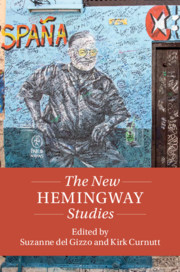Book contents
- The New Hemingway Studies
- Twenty-First-Century Critical Revisions
- The New Hemingway Studies
- Copyright page
- Contents
- Contributors
- Introduction Hemingway in the New Millennium
- Part I The Textual Hemingway
- Part II Identities
- Part III Global Engagements
- Chapter 12 “There’s No One Thing That’s True”
- Chapter 13 New World Order, Old World Ways
- Chapter 14 Post-“American” Hemingway Studies
- Chapter 15 Politics, Espionage, and Surveillance
- Conclusion
- Works Cited
- Index
Chapter 14 - Post-“American” Hemingway Studies
Multicultural Approaches and Redefinitions of Expatriation
from Part III - Global Engagements
Published online by Cambridge University Press: 30 August 2020
- The New Hemingway Studies
- Twenty-First-Century Critical Revisions
- The New Hemingway Studies
- Copyright page
- Contents
- Contributors
- Introduction Hemingway in the New Millennium
- Part I The Textual Hemingway
- Part II Identities
- Part III Global Engagements
- Chapter 12 “There’s No One Thing That’s True”
- Chapter 13 New World Order, Old World Ways
- Chapter 14 Post-“American” Hemingway Studies
- Chapter 15 Politics, Espionage, and Surveillance
- Conclusion
- Works Cited
- Index
Summary
In “Post-ߢAmerican’ Hemingway Studies: Multicultural Approaches and Redefinitions of Expatriation,” Jeffrey Herlihy-Mera explores the way that transnationalism has expanded notions of expatriation as they apply to Hemingway’s relationship with the foreign locales that became his adopted home – in particular, Europe, Cuba, and Africa. Beginning with the provocative argument that definitions of “American” are inevitably provisional, Herlihy-Mera examines how Hemingway scholarship in recent years has dislodged notions of him as a “foreigner” in other countries. These redefinitions cut across a range of topics, from Hemingway’s relationships with writers of other nations to his integration into local culture through the adaptation of rituals and sacraments to the psychology of speaking in a second or third language. Herlihy-Mera also explores the rise of critical concepts such as movement and immersion, both of which have redefined perceptions of the relationship between the self and other. Finally, he explores the possibilities that neurolinguistics offers.
- Type
- Chapter
- Information
- The New Hemingway Studies , pp. 221 - 240Publisher: Cambridge University PressPrint publication year: 2020

